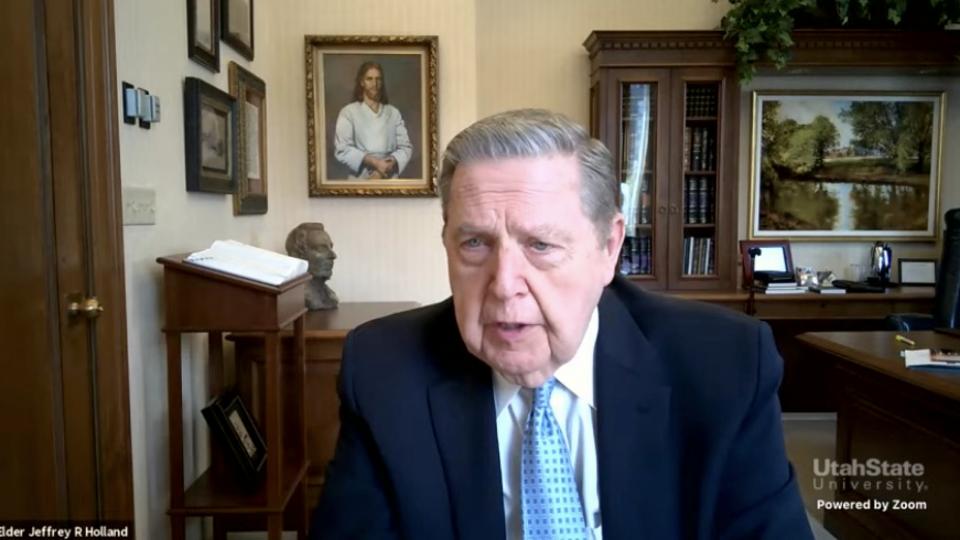
Holland leadership
Elder Jeffrey R. Holland, a member of the Quorum of the Twelve Apostles, told students at Utah State University on April 23, 2021, that perfect leadership is exemplified by the Savior Jesus Christ. Image is a screenshot from the broadcast, courtesy of Utah State University, courtesy of Church News.All rights reserved.This story appears here courtesy of TheChurchNews.com. It is not for use by other media.
By Sydney Walker, Church News
The heart of leadership — perfect leadership exemplified by the Savior Jesus Christ — is love, Elder Jeffrey R. Holland of the Quorum of the Twelve Apostles told Utah State University students.
More important than organizational structures and corporate benchmarks, “it is people we love and people we lead,” he said.
During his remarks as part of “The World’s Principled Leader Series” presented by the Covey Leadership Center at the Jon M. Huntsman School of Business on Friday, April 23, Elder Holland was asked how leaders can maximize opportunities to build others.
“I think when you can see in people, when you can recognize in others, something you admire, it is very easy to praise them,” Elder Holland told the virtual audience. “It is very easy to encourage and appreciate them. I always see things in people that I genuinely love and admire.”
His message titled “Jesus, the Perfect Leader” was streamed on YouTube and hosted by Boyd Craig, Stephen R. Covey endowed professor of leadership and vice chairman of the Stephen R. Covey Leadership Center, and Lord Michael Hastings of Scarisbrick, England, Stephen R. Covey endowed professor of leadership.
Using the New Testament, Elder Holland highlighted six of many principles central to the Savior’s leadership.
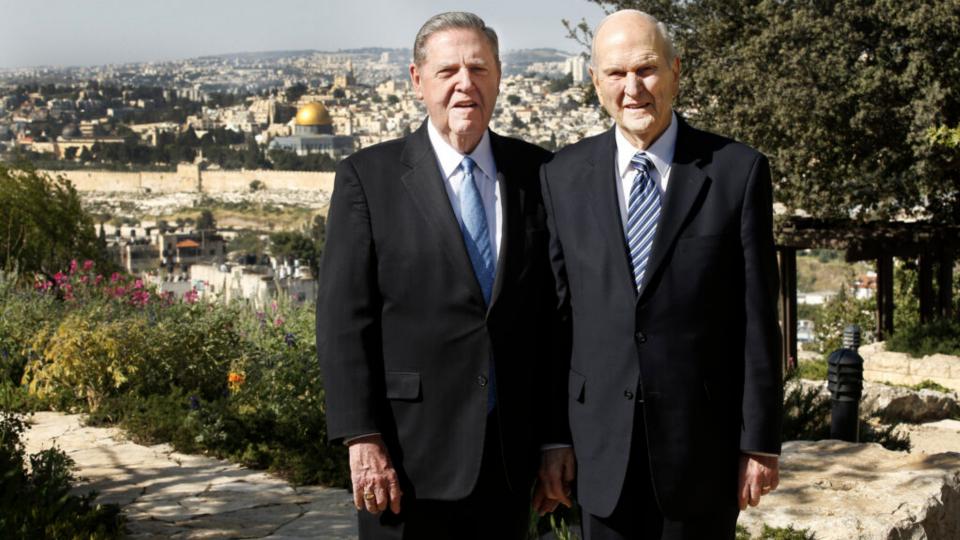
Holland Leadership
President Russell M. Nelson, president of The Church of Jesus Christ of Latter-day Saints, right, and Elder Jeffrey R. Holland of the Quorum of the Twelve Apostles stand together at the BYU Jerusalem Center in Jerusalem on Saturday, April 14, 2018. Photo by Jeffrey D. Allred, courtesy of Church News.Copyright 2021 Deseret News Publishing Company.1. The Savior Chose the Perfect Cause
The Savior’s cause was love, and He applied that cause to the salvation and redemption of humankind, Elder Holland said.
Through His Atonement, the Savior exemplified the very meaning of love, and He invited His followers to love as He did. “A new commandment I give unto you, That ye love one another; as I have loved you, that ye also love one another. By this shall all men know that ye are my disciples, if ye have love one to another” (John 13:34-35).
With the advantages of increased accessibility of education and means of communication, today’s students and leaders can pursue a variety of causes, Elder Holland noted.
“If we are going to devote ourselves to something and give our life to something,” he said, “let’s make sure it is a cause worth pursuing, a standard worth bearing, a flag worth flying.”
2. He Was Loyal to His Cause
The Savior was completely loyal and devoted to His cause, Elder Holland said. “Once that mission began, He retained this great sense of mission to the very end.”
When the Savior foretold His death to His disciples — “The hour is come, that the Son of man should be glorified” — He, with a troubled soul, called upon the Father to “save me from this hour” (John 12:23, 27).
“But immediately,” Elder Holland said, “in the same sentence separated only by a semicolon, John records that He says, ‘but for this cause came I unto this hour.’” In other words, “I can’t ask to be saved from this hour because this hour is what my life is about.”
“So He says, ‘Father, glorify thy name.’ Give me the strength. Help me do this. Let me succeed,” Elder Holland said.
“With anything less than that devotion, I think Jesus would not have succeeded, and we would not be having this seminar. We would not be talking about Him the way that we do 2,000 years later.”
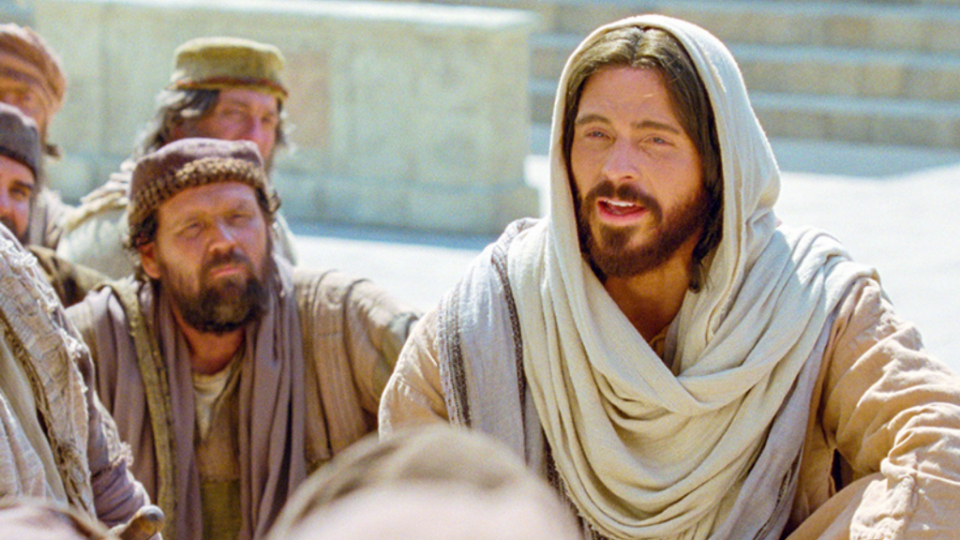
YW-Shepherds
A Bible Videos depiction of Jesus teaching a crowd of people.2020 by Intellectual Reserve, Inc. All rights reserved.3. He Was a Leader — and Follower
Every leader has to learn to be a follower — “first, and maybe always,” Elder Holland said.
While implementing the sacrament of the Lord’s supper with His disciples prior to atoning in the Garden of Gethsemane and on the summit of Calvary, the Savior “riseth from the supper … took a towel, and girded himself … and began to wash the disciples’ feet” (John 13:1-5).
“That was a gesture meant to convey to them, as He said, that the master would always have to be the servant of the people,” Elder Holland said.
Those who lead will likely have to “spend some time, figuratively or literally, down on their knees, with a basin of water and some very dirty feet,” he said. Christlike leaders lift others through the difficult challenges and complex moments of their lives.
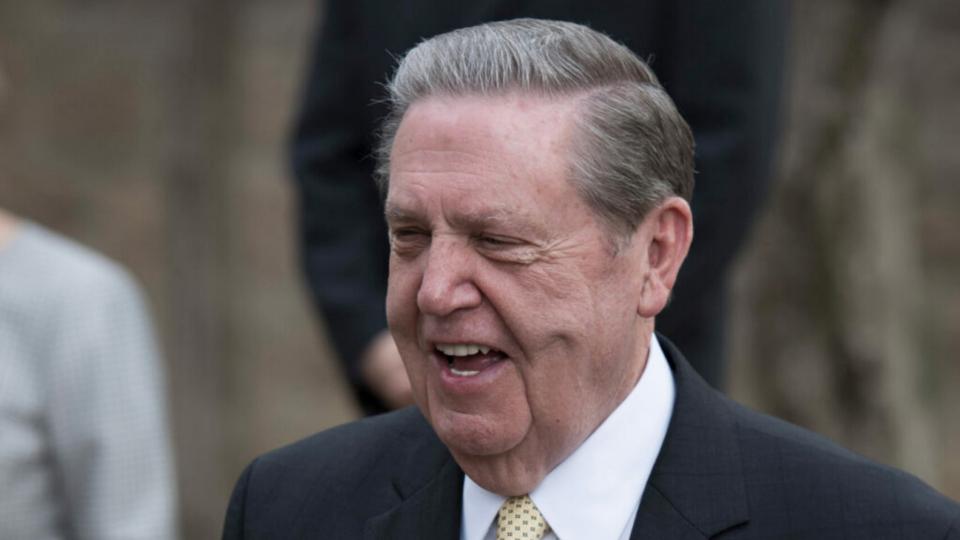
Holland Leadership
Elder Jeffrey R. Holland, a member of the Quorum of the Twelve Apostles, visits the Orson Hyde Memorial Garden in Jerusalem, October 27, 2016. Copyright 2021 by Intellectual Reserve, Inc. All rights reserved.4. His Leadership Was ‘Participatory’ and ‘Experiential’
The Savior engaged His listeners and taught by questions, Elder Holland said. Often answering a question with a question, He would lead others to discover their own answers.
On the coast of Cæsarea Philippi, the Savior asked His disciples, “Whom do men say that I the Son of man am?” After their various responses, He then asked, “Whom say ye that I am?”
Simon Peter declared, “Thou art the Christ, the Son of the living God” (Matthew 16:13-20).
The Savior knew, Elder Holland said, that by inviting Peter to make that expression, those words would become more motivational and take on a special meaning for him as he became the chief Apostle.
The Savior’s experiential leadership is also evident in His response to Philip and Andrew’s question, “where dwellest thou?” (John 1:38-39). Instead of giving them directions or telling them where, He invited them to “come and see.” He wanted them to experience His answer, not just hear it.
5. Sometimes Rules Have to Be Adjusted
In another New Testament account, the Savior and His disciples were traveling through corn fields on the Sabbath. They were hungry and plucked ears of corn to eat as they went. Jesus responded to criticism with this teaching: “The sabbath was made for man, and not man for the sabbath” (Mark 2:23-28). Jesus was later criticized for healing on the Sabbath (John 5:4-16).
Jesus personified the virtue of the Sabbath, Elder Holland explained, not the hollow formalism of it. “If he felt a human need or a gospel principle was greater than — or was a special extension of — the Sabbath at any given moment, then He would feel free to harvest the corn or heal the lame man.”
Leaders cannot simply disregard the rules of their organizations with impunity, Elder Holland said, but with the trust and confidence of the people, rules can be adjusted. Just as the Savior proved His integrity, “Establish your integrity by first being a rule-keeper. Then you can adjust what you need to adjust as an exception to the rule,” he told the students.
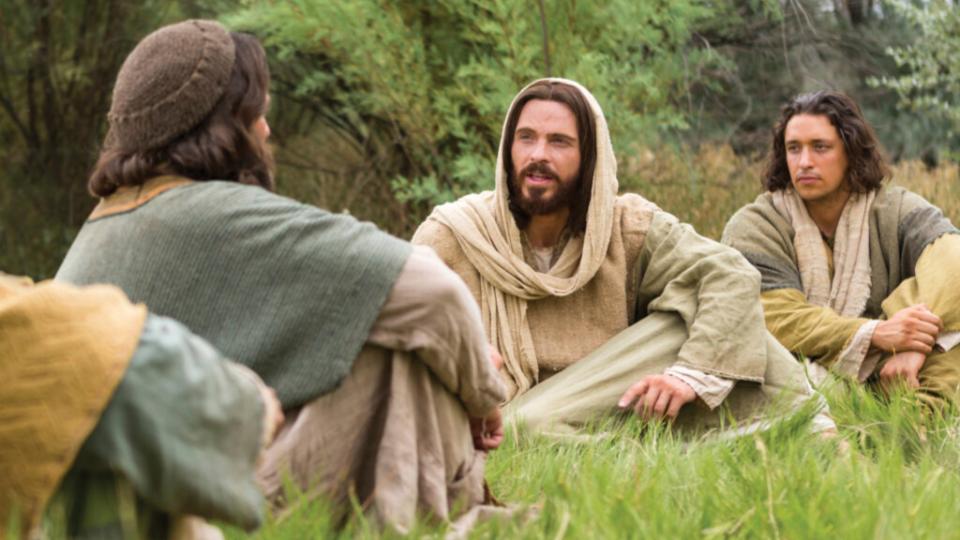
Christlike-Questions-1.jpeg
In this scene from the Bible Videos, Simon Peter answers Christ and tells him “Thou art the Christ.”© 2021 by Intellectual Reserve, Inc. All rights reserved.6. He Gave Credit to the Father
When the rich young ruler addressed Jesus as “Good Master,” He responded: “Why called thou me good? There is none good but one, that is, God” (Matthew 19:16-17).
Later, as Jesus was nearing the end of His mortal ministry and promised peace to His disciples, He said, “If ye loved me, ye would rejoice, because I said, I go unto the Father: for my Father is greater than I” (John 14:27-28).
Referencing these verses, Elder Holland said, “From start to finish, for all the grandeur of His life and for all the magnificence of His perfect leadership, Christ would deflect that credit and, in His humility, offer it as a compliment to His Father in Heaven.”
Finding Balance, Living With Disappointment
Following his remarks, Elder Holland answered a few questions from students about effective leadership. One student asked how to care for emotional well-being and mental health while trying to balance various demands.
Elder Holland said while he was in graduate school he experienced one of the most demanding times of his life. With little money and young children to care for, Elder Holland struggled to find balance among attending school full time, teaching part time, his Church calling and his family.
Watch a video where Elder Holland talks more about this time of his life.
“What I learned is that before I thought about the Church service, before I thought about my education, even before I tried to be a good husband and father, I had to take care of my own spiritual and physical health,” he said.
By taking care of a few basics — such as eating right, getting adequate sleep, and taking time to pray — Elder Holland found he was a better spouse, father, student and member of the Church.
In response to a question about how to live with struggles and disappointments, Elder Holland said the most important lessons he has learned in life have often come from disappointments.
“Embrace them,” he said. “Don’t flee. Don’t run from the very experiences that may make you what you ought to be — more refined and more sensitive, perhaps more kind, more patient with other people’s problems and other people’s disappointments.”
Copyright 2021 Deseret News Publishing Company